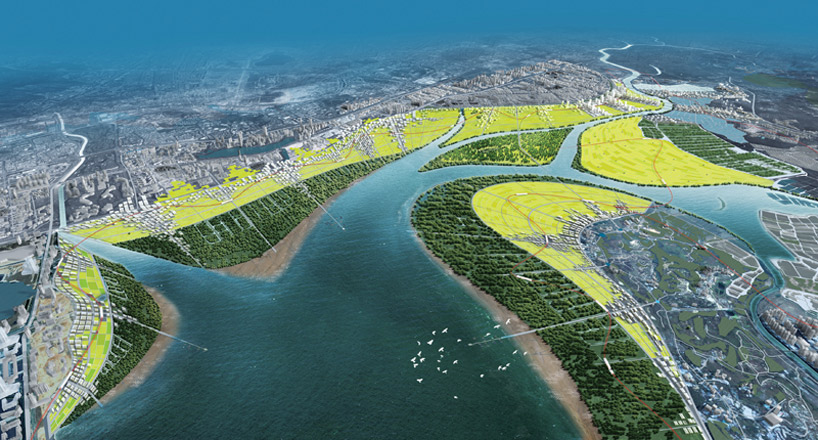
'counterpart cities: climate change and cooperative action in hong kong and shenzhen'
natural sedimentation, aquaculture practices, and ecological systems are harnessed as driving forces for new urban development in hong kong and shenzhen.
© guochuan feng, zhubo design
'counterpart cities' an organization facilitating cooperative action in hong kong and shenzhen due to climate change,
proposes solutions to the degradation of the environment and rising of sea levels in the region. project curators
jonathan solomon and dorothy tang coordinated a team of designers comprised of stefan al, guochuan feng, vincci mak,
doreen liu, tom verebes and xiongyi zhu in order to develop potential solutions for the great climate change occurring
in the area. the six design teams which hail from both chinese cities, investigate the interdependent effect of these cities
on the ecology of the pearl river delta.
the intention of the 'counterpart cities' project workshop was to both provide a platform to begin productive dialogue
surrounding climate change and to consider innovative alternatives to current infrastructure. due to human influence
three distinct systems to the pearl river delta have become threatened: freshwater networks, port infrastructure,
and shoreline ecologies. what makes these three systems of interest to a collaborative effort is due to their effect
on the interconnected ecosystem of shenzhen and hong kong. the conversation between the design teams of both cities
continue to question existing infrastructure in order to combat the rising sea-level and regional flooding.
'counterpart cities' exhibition was presented at the shenzhen hong kong bi-city biennale of architecture and urbanism.
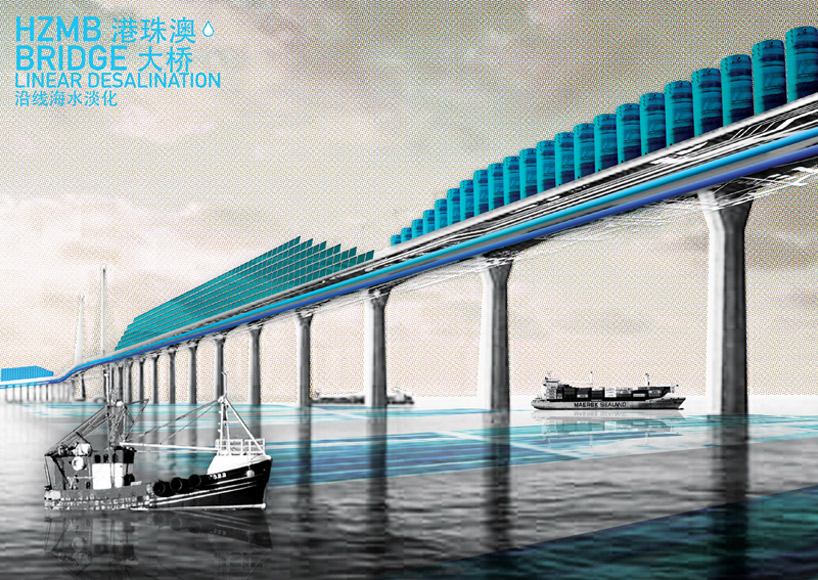
digital rendering of a decentralized freshwater collection and storage system which uses existing infrastructure to create a new network of resource sharing.
© stefan al, courtesy of the university of hong kong
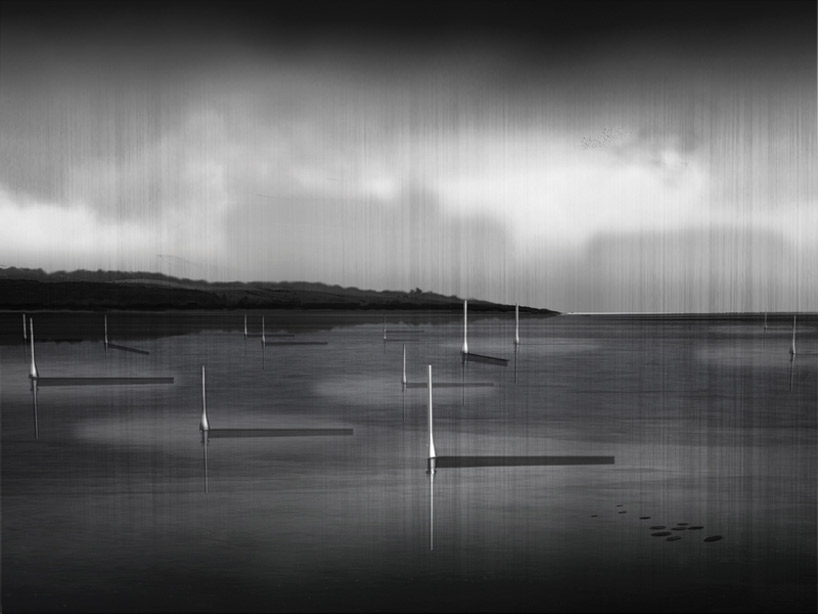
water currents and sedimentation patterns of the deep bay are altered by large-scale inhabitable infrastructure, raising awareness of both natural sea level rise and human engineering of the territory.
© vincci mak, courtesy of the university of hong kong
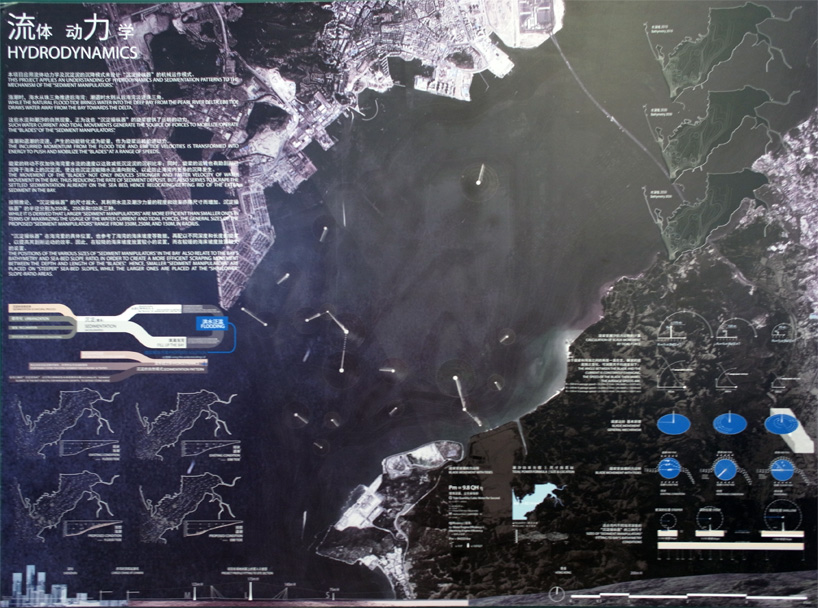
visuals at the installation juxtaposes maps, scientific data, graphs, and other information
© dorothy tang and jonathan solomon, courtesy of the university of hong kong; photo © designboom
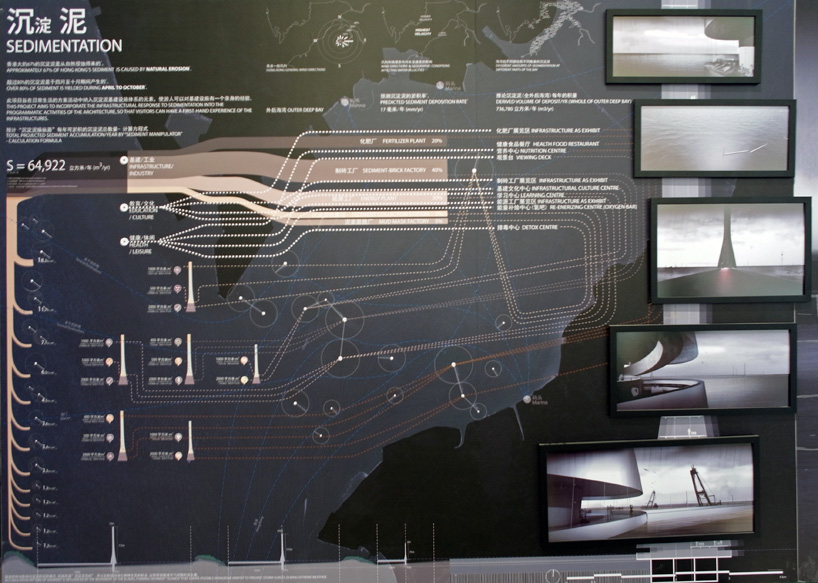
sedimentation data and visual
© dorothy tang and jonathan solomon, courtesy of the university of hong kong; photo © designboom
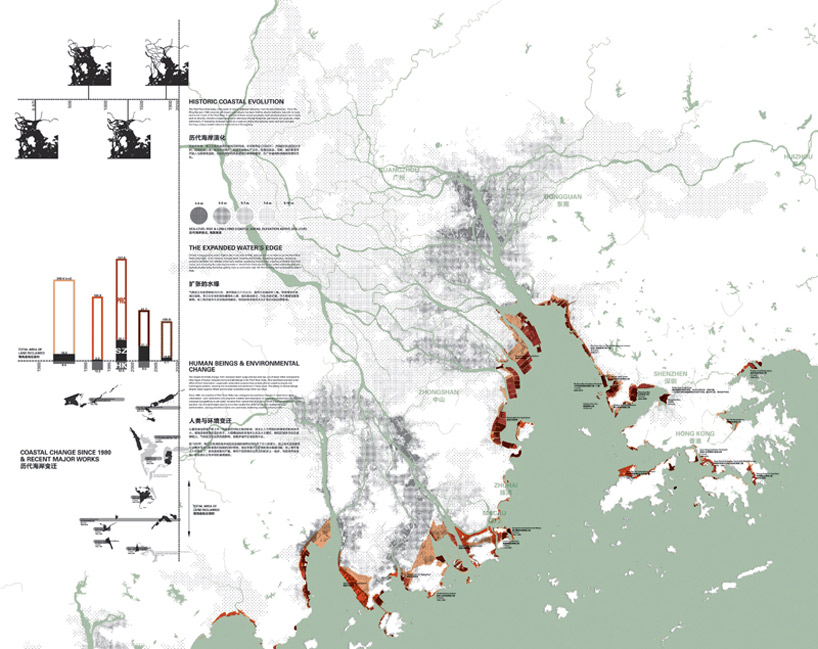
map detailing major coastline land reclamation projects versus sea-level rise risk that substantially refigures the pearl river delta.
© dorothy tang & jonathan solomon, courtesy of the university of hong kong
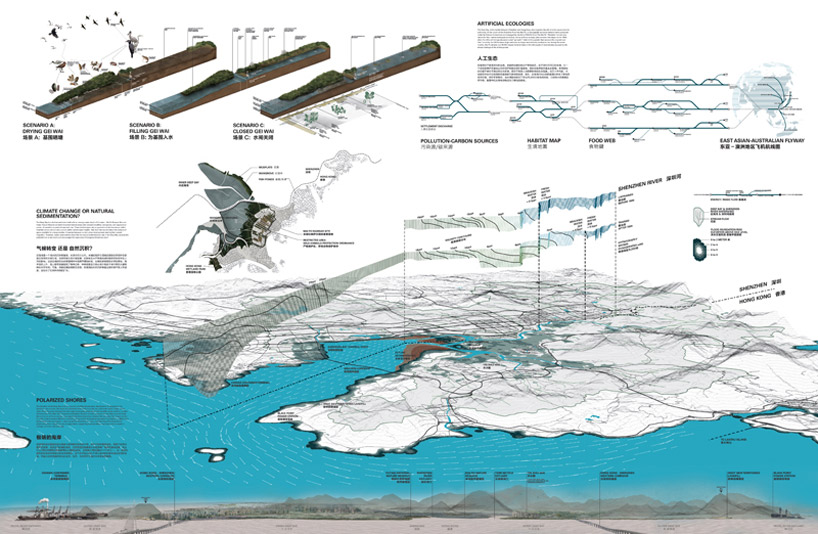
the deep bay delineates the border between hong kong and shenzhen. its ecological value relies on aquaculture practices and human waste, yet is threatened by increased urbanization in its watershed.
© dorothy tang & jonathan solomon, courtesy of the university of hong kong
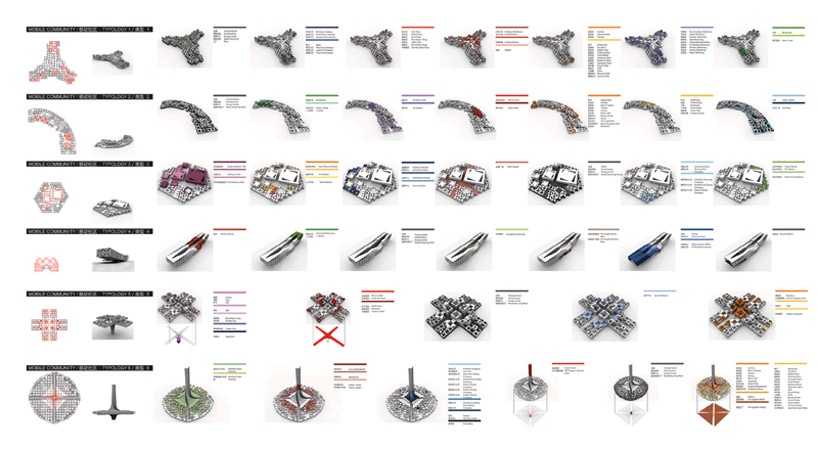
a new mobile port network integrates logistics, business, living and recreation along the shoreline for increased cultural exchange.
© xiongyi zhu, ccdi
proposes solutions to the degradation of the environment and rising of sea levels in the region. project curators
jonathan solomon and dorothy tang coordinated a team of designers comprised of stefan al, guochuan feng, vincci mak,
doreen liu, tom verebes and xiongyi zhu in order to develop potential solutions for the great climate change occurring
in the area. the six design teams which hail from both chinese cities, investigate the interdependent effect of these cities
on the ecology of the pearl river delta.
the intention of the 'counterpart cities' project workshop was to both provide a platform to begin productive dialogue
surrounding climate change and to consider innovative alternatives to current infrastructure. due to human influence
three distinct systems to the pearl river delta have become threatened: freshwater networks, port infrastructure,
and shoreline ecologies. what makes these three systems of interest to a collaborative effort is due to their effect
on the interconnected ecosystem of shenzhen and hong kong. the conversation between the design teams of both cities
continue to question existing infrastructure in order to combat the rising sea-level and regional flooding.
'counterpart cities' exhibition was presented at the shenzhen hong kong bi-city biennale of architecture and urbanism.

digital rendering of a decentralized freshwater collection and storage system which uses existing infrastructure to create a new network of resource sharing.
© stefan al, courtesy of the university of hong kong

water currents and sedimentation patterns of the deep bay are altered by large-scale inhabitable infrastructure, raising awareness of both natural sea level rise and human engineering of the territory.
© vincci mak, courtesy of the university of hong kong

visuals at the installation juxtaposes maps, scientific data, graphs, and other information
© dorothy tang and jonathan solomon, courtesy of the university of hong kong; photo © designboom

sedimentation data and visual
© dorothy tang and jonathan solomon, courtesy of the university of hong kong; photo © designboom

map detailing major coastline land reclamation projects versus sea-level rise risk that substantially refigures the pearl river delta.
© dorothy tang & jonathan solomon, courtesy of the university of hong kong

the deep bay delineates the border between hong kong and shenzhen. its ecological value relies on aquaculture practices and human waste, yet is threatened by increased urbanization in its watershed.
© dorothy tang & jonathan solomon, courtesy of the university of hong kong

a new mobile port network integrates logistics, business, living and recreation along the shoreline for increased cultural exchange.
© xiongyi zhu, ccdi
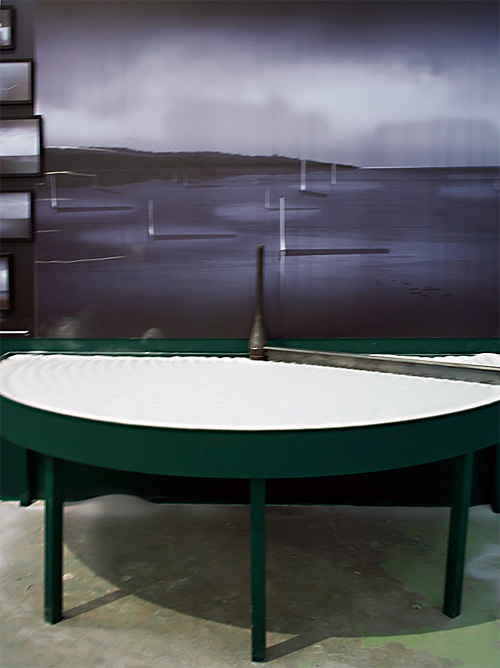
installation view
image © designboom
---
the 2011 SZHK biennale
in shenzhen, china ran from december 8th through december 11th 2011.
the scale of certain projects is such that the architect becomes not only a designer of buildings but also city planner and landscape
architect and the shenzhen & hong kong bi-city biennale of urbanism \ architecture reflects this in its theme:
architecture creates cities - cities create architecture.
the SZHK biennale is the first to focus on urbanism as an ongoing theme to explore issues of the city as an active agent in contemporary culture.
the program included more than 30 exhibitions, symposiums, panel discussions and performances.
terence riley has been appointed chief curator (he is the first international curator for the event).
the hong kong edition will work to complement the shenzhen biennale in an integrative way and is curated by gene king and
anderson lee currently under preparation and due to open in february 2012.
designboom is the principal international media partner of the SZHK biennale.
the 2011 SZHK biennale
in shenzhen, china ran from december 8th through december 11th 2011.
the scale of certain projects is such that the architect becomes not only a designer of buildings but also city planner and landscape
architect and the shenzhen & hong kong bi-city biennale of urbanism \ architecture reflects this in its theme:
architecture creates cities - cities create architecture.
the SZHK biennale is the first to focus on urbanism as an ongoing theme to explore issues of the city as an active agent in contemporary culture.
the program included more than 30 exhibitions, symposiums, panel discussions and performances.
terence riley has been appointed chief curator (he is the first international curator for the event).
the hong kong edition will work to complement the shenzhen biennale in an integrative way and is curated by gene king and
anderson lee currently under preparation and due to open in february 2012.
designboom is the principal international media partner of the SZHK biennale.

No comments:
Post a Comment